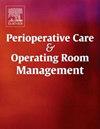Perioperative stress experiences of patients before surgical operation: A phenomenological study
IF 1
Q2 Nursing
Perioperative Care and Operating Room Management
Pub Date : 2025-03-24
DOI:10.1016/j.pcorm.2025.100485
引用次数: 0
Abstract
Aim
The aim of this study was to evaluate patients' experiences of perioperative stress before surgery using a phenomenological approach.
Design
In the study, in which phenomenological research method was used, semi- structured in-depth interviews were conducted with 12 patients who were treated in the orthopedics clinic.
Method
Criterion sampling method, one of the purposive sampling methods, was used to reach the sample group. Interviews continued until data saturation was achieved. All interviews were recorded on a voice recorder after obtaining the necessary permissions and then transcribed. The data of the study were evaluated using thematic analysis. The study was conducted and reported according to the COREQ checklist.
Results
In the analysis of the data, three main themes (situations experienced before the surgical operation, feelings and thoughts about the operating room, and perioperative stress and thoughts about healthcare professionals) and seven sub-themes (mental, physical, social, emotions, thoughts, positive thoughts and negative thoughts) were identified.
Conclusion
It was found that patients experienced many psychosocial difficulties, especially fear and anxiety, in the preoperative period. It can be said that the difficulties experienced are related to both the surgical process and the operating room environment and the communication and interaction of healthcare professionals. In this context, determining the fear and anxiety levels of patients in the preoperative process, providing standardized comprehensive trainings to patients in order to prevent different practices related to the surgical process, organizing in-service trainings to strengthen the communication skills of healthcare professionals are very important for the healthy management of the process and providing holistic nursing care.
围手术期患者术前应激体验的现象学研究
研究采用现象学研究方法,对 12 名在骨科门诊接受治疗的患者进行了半结构式深度访谈。方法采用标准抽样法(目的性抽样法之一)确定样本组。访谈一直持续到数据饱和为止。所有访谈均在获得必要许可后用录音机录制,然后进行誊写。研究数据采用专题分析法进行评估。结果在对数据进行分析时,确定了三个主要主题(手术前经历的情况、对手术室的感受和想法、围手术期压力和对医护人员的想法)和七个次主题(心理、身体、社交、情绪、想法、积极想法和消极想法)。可以说,这些困难与手术过程和手术室环境以及医护人员的沟通和互动都有关系。在这种情况下,确定患者在术前过程中的恐惧和焦虑程度,为患者提供标准化的综合培训以防止与手术过程有关的不同做法,组织在职培训以加强医护人员的沟通技巧,对于健康管理手术过程和提供整体护理非常重要。
本文章由计算机程序翻译,如有差异,请以英文原文为准。
求助全文
约1分钟内获得全文
求助全文
来源期刊

Perioperative Care and Operating Room Management
Nursing-Medical and Surgical Nursing
CiteScore
1.30
自引率
0.00%
发文量
52
审稿时长
56 days
期刊介绍:
The objective of this new online journal is to serve as a multidisciplinary, peer-reviewed source of information related to the administrative, economic, operational, safety, and quality aspects of the ambulatory and in-patient operating room and interventional procedural processes. The journal will provide high-quality information and research findings on operational and system-based approaches to ensure safe, coordinated, and high-value periprocedural care. With the current focus on value in health care it is essential that there is a venue for researchers to publish articles on quality improvement process initiatives, process flow modeling, information management, efficient design, cost improvement, use of novel technologies, and management.
 求助内容:
求助内容: 应助结果提醒方式:
应助结果提醒方式:


